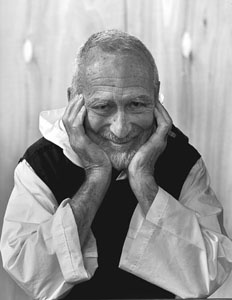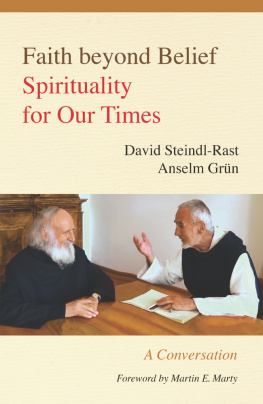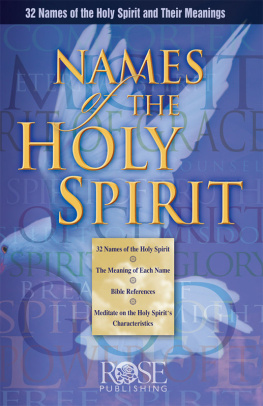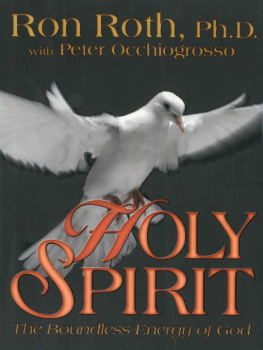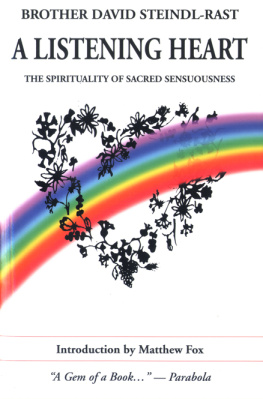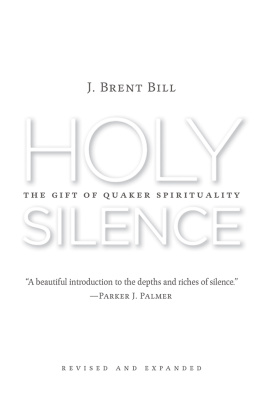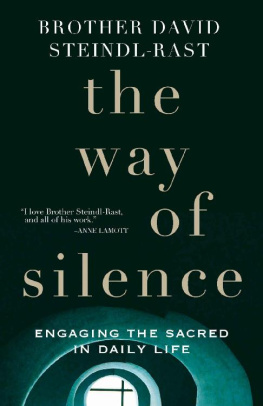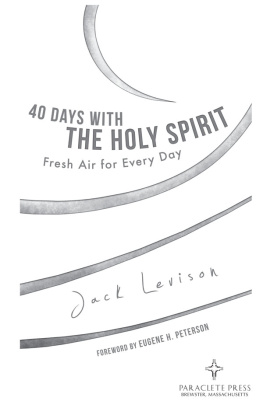Chapter One: Learning to Pray in Silence
There is a negative meaning to silence and a positive one. Negatively, silence means the absence of sound or word. In these pages we focus on its positive meaning. Silence is the matrix from which word is born, the home to which word returns through understanding.... For those who know only the world of words, silence is mere emptiness. But our silent heart knows the paradox: the emptiness of silence is inexhaustibly rich; all the words in the world are merely a trickle of its fullness.
From Gratefulness, the Heart of Prayer
M y earliest recollection of formal prayer is this: My grandmother, rosary in hand, resting on her bed after our noonday meal, would let the beads glide through her fingers, silently moving her lips.
When I remember how large her bed loomed from my perspective, I realize I must have still been small. Yet when I asked her to teach me this mysterious game, she did. The stories behind the fifteen mysteries as my grandmother told them to me stayed in my mind and grew in my heart. Like seedlings taking root in good soil, they kept growing and sending out runners. To this day, like an old strawberry patch, they keep bearing fruit.
Some thirty years later, on a different continent, my grandmother was again resting on her bed and I was kneeling next to her; this time, she was dying. My mother also knelt by her mothers deathbed, and together the two of us were reciting from the English breviary the prayers for the dying. Grandmother was in a coma, but she seemed restless. She would raise her left hand a little and let it fall back on the bed, again and again. We could hear the tinkling of the silver rosary wrapped around her wrist. Finally, we caught on. We stopped the psalms and started the sorrowful mysteries of the rosary.
My Son came with His apostles to the Mount of Olives. There was a garden there that He frequently went to pray: He felt a sadness; a deep, deep sadness. He felt lonely: my Son in His humanity felt a deeper sadness than anyone could ever feel because He was pure of heart: He was sinless. He took His closest friends, Peter whom He was to give charge of the Church, James, and John. John was the one who was going to take care of me after Jesus had risen from the dead. Jesus said to them: My heart is sorrowful to the point of death: stay here and pray and keep watch while I go and pray by Myself. Jesus went over further to pray: He wanted to pray by Himself. He wanted to pour out His heart to His Father.
At its familiar phrases, grandmother relaxed, and when we came to the mystery of Christs death on the cross, she peacefully gave her life-breath back to God.
Another childhood memory of mine is connected with the Angelus prayer. All over my native Austria, the chorus of Angelus bells rises from every church steeple at dawn, at high noon, and again before dark in the evening. At school one day when I was in first grade, I stood by an open window on the top floor looking down on what you might call the campus, for ours was a big, beautiful school built by the Christian Brothers. It was noon. Classes had just finished, and children and teachers streamed out onto the courts and walkways. From so high up, the sight reminded me of an anthill on a hot summer day. Just then, the Angelus bell rang out from the church, and at once, all those busy feet down there stood still. The angel of the Lord brought the message to Mary. We had been taught to recite this prayer in silence. Then, the ringing slowed down; one last stroke of a bell and the anthill began swarming again.
Now, so many years later, I still keep that moment of silence at noon. Bells or no bells, I pray the Angelus. I let the silence drop like a pebble into the middle of my day and send its ripples out over its surface in ever-widening circles. That is the Angelus for me: the now of eternity rippling through time.
Hail Mary, full of grace,
The Lord is with Thee;
Blessed art thou among women,
And blessed is the fruit of thy womb, Jesus.
Holy Mary, Mother of God,
Pray for us sinners,
Now and at the hour of our death. Amen.
Id like to recount one more memory here, the memory of my first encounter with the Jesus Prayer, the Prayer of the Heart, as it is also called. By then, I was older but still a child; twelve, maybe. I was sitting with my mother in our doctors waiting room, resting my right hand first on one knee, then on the other, then on the armrest of my chair, then on the sill of a window from which I could see only a high hedge and some spider webs. My hand was heavily bandaged, and I had come to have the doctor change those bandages. After I had examined for some time a jar full of live leeches, which country doctors at that time still kept for bloodletting, there wasnt anything else in the bare room to keep me entertained, and I was growing fidgety.
Then my mother said something that surprised me: Russian people know the secret of never getting bored. The Olympic Games were my only association with Russians, but if there was a secret method for overcoming boredom, I needed to learn it as soon as possible. Only years later, when I came across the anonymously written classic of Eastern Orthodoxy, The Way of a Pilgrim , did I understand my mothers mysterious reference, for that book was a translation from the Russian.
Lord Jesus Christ, have mercy on me, a sinner.
The Way of a Pilgrim did tell me at length about that secret of never getting bored, but my mother had managed to summarize it so simply that it made even more sense to a boy of twelve: You need only repeat the name of Jesus over and over with every breath. Thats all. The name of Jesus will remind you of so many good stories that you will never find the time long. I tried it and it works.
Boredom, as it turned out, would never be a problem in my life anywayrather the contrary. Later, in fact, when the Jesus Prayer became my steady form of praying, I came to think of it more as an anchor that keeps me grounded when life is anything but boring. To borrow a phrase from the Roman Missal, the Jesus Prayer keeps my heart anchored in lasting joy.
After I read The Way of a Pilgrim , I made myself a ring of wooden beads that I move, one bead at a time, as I repeat the Jesus Prayer. This movement of my fingers has become so linked with that prayer that I can keep it going with the help of my prayer-ring, even while I am reading or talking with someone. It goes on like background music, not in the foreground of my awareness and yet heard at all times.
The wording Ive come to find most helpful is Lord Jesus, mercy! The Russian Pilgrim used that longer form, and I have experimented with various versions, but this one suits me best.
Most of the time it expresses my gratefulness: As I face a given situation and take it all in, I see this given reality as one facet of Gods ultimate gift, which is summed up in the name of Jesus. Then, breathing out, I say the second half of the prayer, and the sense is: Oh, with what mercy you are showering me, moment by moment! Sometimes, of course, Mercy! can also be my cry for help, say, when I am dead tired and have to go on to meet a deadline, or when I am reading about the destruction of rainforests, or of the tens of thousands of children who starve to death every twenty-four hours on this planet of plenty. Mercy! I sigh, Mercy!


